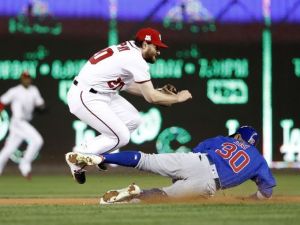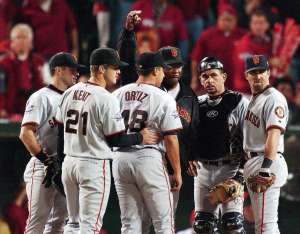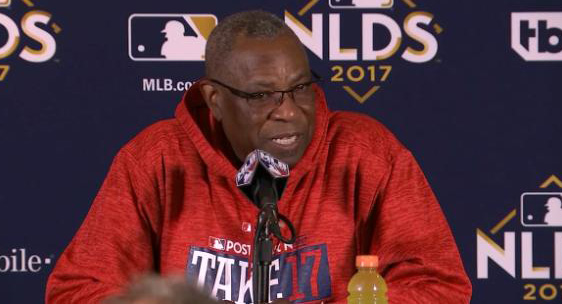Responsibility for success or failure in professional sports can cut a fine line. Is it defined by the quality of individual player performance? By the strength of team dynamics, or the decisions and strategy of a manager or coach?

There is a tendency to nod knowingly, say “all of the above”, and then move on to more important questions (like nachos or Cap’n Crunch for breakfast?).
The Washington Nationals recently booted Game 5 of the 2017 National League Division Series to the Chicago Cubs, losing 9-8 in a grinding 4 hour and 37 minute war. It was a game filled with amazing plays, epic fails, and (most importantly) the poison pill of bad management.
The Chicago/Washington series, and specifically the Game 5 showdown, was a chance at professional redemption for Nationals Manager Dusty Baker, whose dismal managerial history needed massive ER rehabilitation, along with several cases of room deodorizer.
But to begin with, Baker started this critical NLDS deciding game with an inexplicable Nats batting line-up.

While that alone made the decision incomprehensible, Werth’s 2017 season numbers made Baker’s decision inconceivable.
Jayson Werth put up a .715 OPS in the 2017 season with a .322 on base percentage. A .322 OBP!
Hitting way down at 6th in Baker’s line-up was third baseman Anthony Rendon, who had a .937 OPS in 2017 with a .403 OBP.
That was the first of several critical line-up mistakes by Manager Baker, who also made the decision to start LHP Gio Gonzalez. In the 2017 regular season Gonzalez led all National League pitchers with 79 walks allowed.
So what was Dusty Baker’s main reason for going with Gio Gonzalez?
At his pre-game press conference Baker told reporters, “Gio had gone to Game 5 a couple of years ago, and didn’t do too well, so I’m sure redemption is on his mind as well.”
In 2012 Gonzalez started Game 5 for Washington against the St. Louis Cardinals and gave up 3 ER in 5 IP.

In another snub to analytics, Baker batted his best hitter, Bryce Harper, third in the batting order—just the way they did it in the 1970s.
And understand, this is not about cheap second-guessing, or the obvious clarity of hindsight. This is all about process and not results.
In fact, if the Nationals had won Game 5, the line-up decisions Baker made would still have been wrong; he just would have been lucky.
The best line-up Dusty Baker could have put up against Chicago would have been Harper batting second (which the data long ago identified as the best spot in the batting order for a team’s best hitter), Anthony Rendon batting third, followed by 1B Ryan Zimmerman, and 2B Daniel Murphy.
Baker is often quaintly described as an “old school” or “traditionalist” manager, and that does a disservice to many “old-time” baseball managers. Because throughout the game’s history a number of them were not merely traditionalists– they were also creative and successful.
Dusty Baker is the ultimate example of a baseball manager who has relentlessly resisted and criticized the innovation, analytic transformation, and unprecedented access to new information that has changed everything about Major League Baseball the past fifteen years.
For Baker the baseball decision-making process is all about whatever pops into your head at any given moment– a shoot from the hip, eye-test morass of subjective impulses with virtually no analytic oversight.
And Baker backs that up with his one-man war against analytics, specifically the value of on base percentage. OBP is, as we know, the holy grail of advanced metrics and the historic cornerstone of the Oakland A’s early 2000’s Moneyball teams. Which, by the way, changed baseball forever.
Several quotes.
“On-base percentage is great”, Baker once suggested, “if you can score runs and do something with that on-base percentage. Clogging up the bases isn’t that great to me.”
“I think walks are overrated unless you can run… If you get a walk and put the pitcher in a stretch, that helps. But the guy who walks and can’t run, most of the time they’re clogging up the bases for somebody who can run.”
And how has that kind of approach worked out for him and his teams over the years?
> One of the epic collapses in modern baseball history happened to the San Francisco Giants in 1993. In Dusty Baker’s first managerial job, his Giants had a commanding 9.5 game lead over the second place Atlanta Braves on August 7th.
Baker lost that lead and then just had to win the last game of the season to force a one game play-off with the Braves.
The Giants lost the last game of the season 12-1 to the Mets.
> Baker got the 2002 San Francisco Giants to the World Series against the then Anaheim Angels.

The Angels went on to score 6 runs, taking Game 6, then they won Game 7 and the Series behind starter John Lackey.
The Giants fired Baker in the off-season.
> In 2003, Baker managed the Chicago Cubs to the NLCS, and led 3 games to 1 against the Florida Marlins. The Cubs blew the final three games and were eliminated.
> In 2012, Baker was managing the Cincinnati Reds. The Reds made the postseason and led the NLDS by 2 games to 0 against the San Francisco Giants. At home, the Reds lost the next three in a row, and the Giants went on to win the 2012 World Series.
> In 2013, Baker’s Reds lost the NL Wild Card game to the Pittsburgh Pirates, and he was fired that offseason.
> In 2016, Baker’s first year as the Nationals’ manager, they won the NL East but lost the NLDS to the Los Angeles Dodgers, losing Game 5 by a score of 4-3.
All in all, Dusty Baker has managed a total of 55 post season baseball games, putting up a 23-32 (.418) record. Hard to continually blame player performance with that kind of result.
There is, however, another aspect to Dusty Baker’s story. In assessing Baker’s philosophy and record, it is also important to note his contributions to Major League history.
Baker is currently one of only two African American managers in the game (along with Dave Roberts of the Dodgers). He is also one of only three African Americans to manage in a World Series (the others being Toronto’s Cito Gaston and the Rangers’ Ron Washington).
In 1974, Frank Robinson became the baseball’s first African American manager when he was hired by the Cleveland Indians. Baseball’s African American hiring record since then has been dismal.
As of October 13, 2017, there are four managerial vacancies in Major League Baseball, with more to come. With so many talented black coaches and ex-players available, let’s hope that minority candidates get more than a few courtesy interviews in the coming weeks.
Add The Sports Daily to your Google News Feed!
